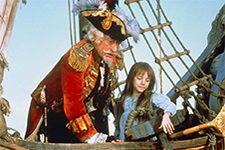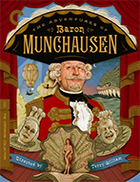The Adventures of Baron Munchausen (4K UHD)
|  In the opening passage of the chapter on The Adventures of Baron Munchausen in the book Gilliam on Gilliam, editor/interviewer Ian Christie asks the former Monty Python member and oft-embattled filmmaker, “After the very public and exhausting battles over Brazil, you might have turned to something more straightforward. But The Adventures of Baron Munchausen became even more of an ordeal, although for different reasons.” “Even more of an ordeal” is putting it lightly, which Gilliam does not do in the ensuing pages. Just to pick a few quotes directly from Gilliam himself: “The production was basically a disaster…. such madness going on … we were doomed … how close to the abyss we were … The worst part was going in every day knowing we couldn’t possibly finish the film….” And that’s just on two pages! Yes, the production woes of Baron Munchausen are legendary and among the favorites when discussing the most disastrous of cinematic disasters: Cleopatra … Heaven’s Gate … Waterworld … Munchausen … And the production was a long-running catastrophe, an epic meeting of multiple perfect storms, the recounting of which makes it hard for one to think that the production was anything other than cursed. There were weather problems, management problems, financial problems, technical problems, casting problems—basically every kind of thing one could imagine going wrong during a film’s production went wrong on Munchausen, with the final insult to injury being the manner in which Columbia, the studio that was the film’s primary financier, essentially dumped the film on its theatrical release because they were trying to get Sony to buy the studio and wanted to make sure the books were balanced first. And all those disasters do make for great stories, especially in hindsight since Gilliam’s “nightmare” didn’t seem to ruin anyone’s career. (Gilliam bounced right back with The Fisher King in 1991, which scored five Oscar nominations and ranked in the top 30 box office hits that year; Munchausen barely made it into the top 100 and cost twice as much). On the other hand, it is unfortunate because all those production disasters forced Gilliam and his team to constantly rework and cut down on the film, which means that the version we have in hand is a far cry from what Gilliam originally envisioned. (Even after all the compromises he made during production, Gilliam had to shorten the film drastically from his original cut, from three hours to barely over two hours, to appease the studio). Sacrifices were made at virtually every turn, meaning that The Adventures of Baron Munchausen, for all its grandeur and beauty and imagination, is a severely compromised work … and it shows. The film is based on the fanciful character Baron Munchausen, who was invented by German author Rudolf Erich Raspe, who wrote about the fictional raconteur’s exploits in a series of satirical magazine articles before compiling them in a 1785 book titled Baron Munchausen’s Narrative of His Marvelous Travels and Campaigns in Russia that was made to look as if it had been penned by the Baron himself. There are some roots in reality, as there was a real-life Baron Karl Friedrich Hieronymus von Münchhausen, who fought in the Russo-Turkish War of 1735–1739 and later became famous within the German aristocracy for spinning tall tales about his exploits. Those tall tales were made all the taller by Raspe, which is why his book was so appealing to fantasy-minded filmmakers, including Georges Méliès, Paolo Azzurri, F. Martin Thornton, and pioneering animator Émile Cohl, who all adapted them during the silent era. The sound era saw new versions from German and Soviet directors, the most famous of which was Czech animation director Karel Zeman’s The Fabulous Baron Munchausen (1962), which merged live action with experimental animation techniques.When Gilliam launched his production, it had been nearly a decade since anyone had attempted to bring the Baron to the screen, the previous attempts being a French animated film Les fabuleuses aventures du légendaire Baron de Munchausen (1979) and the Soviet television film The Very Same Munchhausen (Tot samyy Myunkhgauzen, 1980). Shot primarily at the Cinecittà Studios in Rome and in the desert in Almería, Andalucía, Spain that was home to many a spaghetti western, The Adventures of Baron Munchausen begins in an unnamed European city that is besieged by Turkish soldiers. Within the walled city a theatrical troupe is putting on a play about the fabulous Munchausen, despite the explosions outside and the fact that much of the theatre has collapsed (shades of the war-torn theatrical performance for Napoleon in Gilliam’s Time Bandits [1981]). In the midst of the production the actual (and elderly) Baron Munchausen (John Neville) appears and berates the production for its gross inaccuracies about his exploits. The film then dives deep into a series of episodes involving the Baron’s improbable feats, some of which are told in flashback when the Baron was younger and some of which unfold in the present, with the elderly Baron accompanied by a young girl named Sally Salt (Sarah Polley). Thus, the screenplay, which was penned by Gilliam and his Brazil (1985) co-writer Charles McKeown, jumps back and forth in time just as it jumps back and forth between gritty realism and bizarro fantasy, which is, of course, the expected contour of a Gilliam film. The members of the theatre troupe (Eric Idle, Charles McKeown, Winston Dennis, and Jack Purvis) become the Baron’s associates and comrades in the flashbacks, each of whom is endowed with a superhuman strength (Idle’s Berthold, for example, can run at extraordinary speed, which comes in handy when he needs to chase down a bullet). The episodic nature of the story allows Gilliam to spread the fantasy far and wide, giving us scenes of the Baron and Sally floating away in a ramshackle hot-air balloon constructed of women’s undergarments, an episode in a Turkish harem, a large-scale desert battle, and an extended sequence on the surface of the moon, where the Baron gets in-between the King and Queen of the Moon, who exist as giant floating heads separated from their bodies. The King is played by Robin Williams, who took over after Sean Connery bowed out (producer Thomas Schühly was determined to land Marlon Brando, but never could), although he is credited as Ray D. Tutto because his agent didn’t want the film being sold on his name. Like all of Gilliam’s films, The Adventures of Baron Munchausen is a visual marvel, made all the more marvelous because of its necessary reliance on physical effects and practical production design, which makes it a delightfully tactile experience. Gilliam stuffs the frame with all manner of visual inanities, and as he did in previous films like Monty Python and the Holy Grail (1975), Time Bandits, and Brazil, he gives the film a gritty reality that makes the fantasy elements feel even more believable, rather than playing in contrast. Gilliam has complained that in some ways the film is too beautiful and not ragged enough, which he blames on the legendary Italian cinematographer Giuseppe Rotunno, who had shot numerous films for Luchino Visconti and Federico Fellini, as well as American filmmakers Stanley Kramer, Bob Fosse, Robert Altman, and Mike Nichols. Gilliam was most elated to be working with production designer Dante Ferretti, whose work on the films of Pier Paolo Pasolini, particularly The Canterbury Tales (1972) and Arabian Nights (1974), were highly influential on the look of Gilliam’s own films. The enormity of the sets and the intricacy of Ferretti’s designs are quite exceptional, and even when major budgetary concerns severely restrained their design ambitions (which is particularly true of the moon sequence), the film still looks and feel extraordinary. The risk, of course, is that all the visual wonderment constantly threatens to swallow the characters, but British stage veteran John Neville manages to hold the frame as the Baron, who I am tempted to described as delightfully unhinged except that he is, in the end, quite rational because all his physics-defying, reason-be-damned exploits really happened. His interactions with Polley’s Sally Salt give the film a bit of warmth it might not have otherwise had, although other actors tend to play a bit too broadly, including Jonathan Pryce as the film’s nemesis, an overly rational and controlling mayor (ironic given the anti-authoritarian protagonist he played in Brazil). Similarly, Robin Williams, despite his non-credit, very much feels like he is playing a manic Robin Williams character, which steals some of the magic from the moon sequence. Many of the film’s problems derive from the cuts that had to be made to bring it down to two hours for theatrical release. Gilliam himself has been quite open about all the flaws inherent in the film, notably the rushed pacing, lack of development among the supporting characters, and overuse of Michael Kamen’s score. As Gilliam put it, his original three-hour cut “was so dreamlike, it floated; you could wallow in those images or listen to the ideas,” but the final version “whizzes past in a rush … By the end there was so much energy pushing to get the film out that it actually hurt it.” I would love to see that dreamlike version someday.
Copyright © 2023 James Kendrick Thoughts? E-mail James Kendrick All images copyright © The Criterion Collection | |||||||||||||||||||||||||||||
Overall Rating: 

 (2.5)
(2.5)


